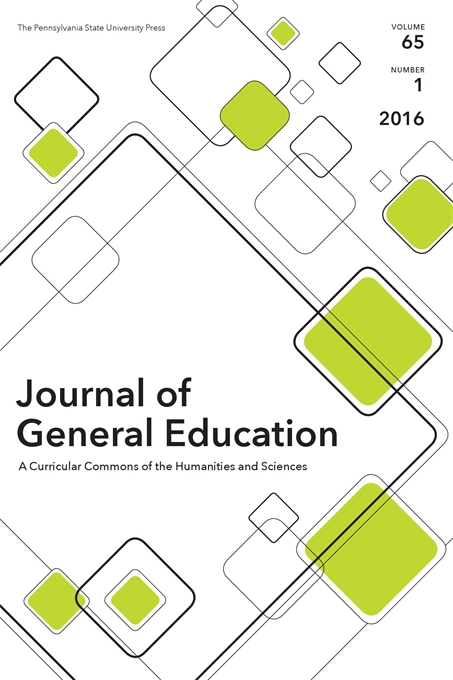Journal of General Education
Laura Cruz, Editor
Margaret Slattery, Editor
- Description
- Board
- Submissions
- Pricing
- Indexing
Access current issues through Scholarly Publishing Collective, Project MUSE, or back content on JSTOR.
Journal of General Education (JGE) is devoted to the ideas and ideals of scholarship that enlighten the understanding of the general education curriculum. General education reaches across disciplinary and professional concentrations to provide an undergraduate educational commons. JGE engages academic communities and the broader public about general education experiments and innovation, including but not limited to the assessment, history, philosophy, and theoretical commitments of general education.
In short, JGE is focused not on a scholarship of general interest to those engaged in undergraduate education. Rather, JGE is a scholarly community interested in general education as a distinctive cornerstone of the arts of liberty that prepare citizens to live engaged, responsible, and meaningful lives.
Association for General and Liberal Studies
Journal of General Education has partnered with the Association for General and Liberal Studies (AGLS) to offer access for individual members and discounts for institutions. Please visit the AGLS website for more information or to join!
Editors
Laura Cruz, The Pennsylvania State University, US
Margaret Slattery, The Pennsylvania State University, US
Articles published in Journal of General Education are selected for the original ideas, cogent arguments, and creative approaches they contribute to enriching the general education endeavor. Each article is assessed by the editors and reviewers for its contribution to the scholarship on general education. Articles that do not match the mission of the Journal (see Description page) will be rejected.
We encourage desk inquiries before submission. Please contact the Editorial Office at .
JGE is particularly interested in thoughtful reflections and reports from those who are currently undertaking general education reform. In addition, JGE welcomes proposals for special issues of the Journal.
All manuscripts must be submitted through our online system. Please visit this site to create an author account, view submission guidelines, and submit: http://www.editorialmanager.com/jge/.
Refer to these submission guidelines before uploading your manuscript.
Institutional Online - $203.00
Institutional Print - $212.00
Institutional Online & Print - $300.00
Institutional Single Issue - $60.00
Individual Online - $62.00
Individual Print - $65.00
Individual Online & Print - $89.00
Individual Single Issue - $23.00
Outside US add Shipping & Handling - $25.00
Education Resources Information Center (ERIC)
European Reference Index for the Humanities and Social Sciences (ERIH PLUS)
IBZ
MLA International Bibliography
Scopus
Mailing List
Subscribe to our mailing list and be notified about new titles, journals and catalogs.




